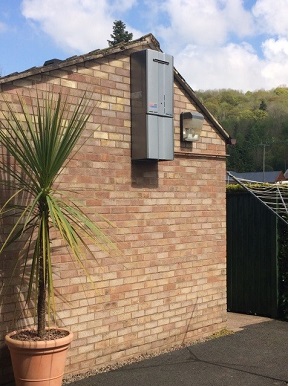Rinnai, the UK leader in hot water heaters for all commercial and residential sites, has recently completed yet another installation at a caravan park and holiday multi-activity centre.
Rinnai HDC 1500e external water heater, fuelled by LPG, was installed at a site in rural Herefordshire as part of regular upgrades on the complex.
The hot water was for a very specific function - the Disabled, Laundry and Dog Washrooms. The water heater needed to supply more than 940 litres per hour at times of high demand. The chosen water heater has a maximum output of 58kW and weighs just 31kg.
Due to space and configuration constraints, the Rinnai 1500e externally mounted water heater was selected and installed neatly on an external façade and accessorised with a pipe cover box to safeguard pipework and create an aesthetically pleasing install. As this is a pre-manufactured water heater, no additional flue or ancillaries are required, aside from standard pipe and electrical connections. The installation was easily completed in less than a single day.
LPG water heaters are one of the cleanest off-grid energy sources and as such are the ideal fuel for water heating applications in rural areas that are off-grid.
“Rinnai Infinity continuous flow water heaters combined with LPG give end users, such as caravan site owners, an unrivalled energy-efficient and environmentally friendly solution. And our water heaters are delivered to site LPG-enabled.”
Chris Goggin, Operations Director at Rinnai
Rinnai, the UK’s leading manufacturer of the ErP A-rated Infinity range of continuous flow condensing gas-fired water heaters, supplies the best energy-efficient range of low-NOx water heaters currently on the market.
Advanced condensing heat exchangers combined with innovative down-firing pre-mix burner technology ensure that every cubic metre of LPG is used to the maximum on HDC water heaters.
One of the site concerns was Legionella proliferation. Therefore, a ‘SMART’ control for the secondary return DHW heaters in the form of an advanced temperature control system was used. This allows for safe running of water at 42°C core temperature during the day and 60°C at a time when the building is closed. By the time the building reopens, the core temperature is 42°C for safe use.
Another Rinnai innovation addresses an age-old industry problem with hot water delivery - lime scale build-up. The company’s integrated scale control system is an innovative solution and comes in the form of an LC (lime check) code on the display of the controller.
Rinnai’s continuous flow Bio-LPG water heaters are also making waves in the industry. Bio-LPG is a renewable form of LPG, produced from sustainable sources, which significantly reduces carbon emissions. This makes Bio-LPG water heaters an excellent choice for environmentally conscious sites looking to reduce their carbon footprint while maintaining high efficiency and reliability.
Environmental Benefits of Bio-LPG Water Heaters
Bio-LPG water heaters offer numerous environmental benefits, making them a superior choice for sustainable energy solutions:
- Reduced Carbon Emissions: Bio-LPG is produced from renewable sources such as organic waste and residues. This significantly lowers the carbon footprint compared to conventional LPG, contributing to a reduction in greenhouse gas emissions.
- Sustainable Production: The production of Bio-LPG involves the conversion of biological materials, which are renewable and sustainable. This process helps in managing waste and reduces reliance on fossil fuels.
- Lower NOx Emissions: Bio-LPG water heaters are designed to produce lower nitrogen oxide (NOx) emissions, which are harmful pollutants that contribute to air quality issues. This makes Bio-LPG a cleaner alternative for heating applications.
- Energy Efficiency: Bio-LPG water heaters, like the Rinnai HDC 1500e, are highly efficient, ensuring that energy is used optimally. This not only reduces energy consumption but also lowers operational costs.
- Compatibility with Existing Systems: Bio-LPG can be used in existing LPG water heaters without the need for significant modifications. This makes it easier for sites to transition to a more sustainable fuel source without incurring high conversion costs.
- Support for Circular Economy: By utilising waste materials for fuel production, Bio-LPG supports the principles of a circular economy, where resources are reused and recycled, minimising waste and environmental impact.
The Rinnai HDC 1500e condensing LPG water heaters, with its advanced technology and eco-friendly fuel options, ensures that sites like the one in Herefordshire can provide ample hot water for all their needs without compromising on sustainability. The use of Bio-LPG water heaters not only supports the environment but also offers cost savings in the long run due to their high efficiency and reduced fuel consumption.
In real terms, swapping from a hot water storage system to a continuous flow water heater can save a site several kilowatts a day, which equates to significant savings annually at current prices. This makes Rinnai’s range of LPG water heaters and Bio-LPG water heaters the ideal solution for any site looking to improve its energy efficiency and sustainability.
To find out more about BioLPG, visit https://www.calor.co.uk/sustainable-fuel.
